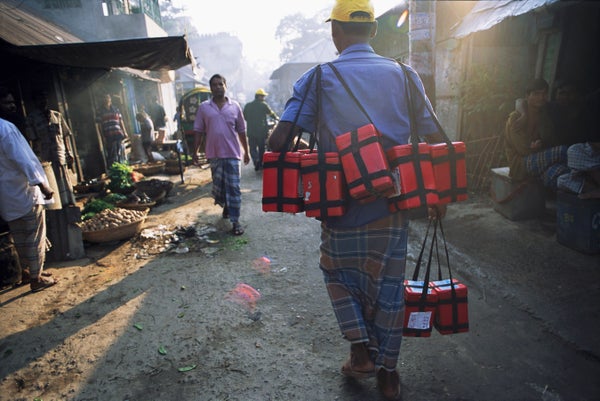This article was published in Scientific American’s former blog network and reflects the views of the author, not necessarily those of Scientific American
It’s easy to forget the momentous strides that have been made in global health in the past few decades. The number of childhood deaths has more than halved since 1990 and there has been great progress in infectious diseases such as HIV/AIDS, with the number of new infections and deaths continuing to decline globally. Guinea worm disease and polio are close to being eradicated and the number of people at risk from neglected tropical diseases has fallen from two billion to 1.6 billion in the last five years. The march towards eradicating these diseases is far from easy and the real groundwork is being made by the brave frontline health workers who work tirelessly in the name of progress.
Progress in global health is always a tough task and is being constantly challenged by a number of factors—including climate change, misinformation and a distrust in science, an aging population and rampant inequality. “Innovation” to confront these challenges has recently become a well-used new buzzword, which threatens to strip it of real meaning. In health, innovation is so much more than the discovery or launching of new therapies, vaccines and/or apps. It is first and foremost about finding better ways of reaching people to improve the efficiency, quality, sustainability or affordability of health care and disease prevention.
Innovation in health can stem from the simple ingenuity of those working on the front lines. I sit on the panel for the REACH Awards, a biennial awards program that celebrates the achievements of on-the-ground innovators and local community health workers. One of the awards recognizes individuals who have developed and implemented a creative technology or practice in support of disease elimination. Two years ago, the Unsung Hero Award went to Regina Lotubai Lomare Lochilangole, from South Sudan.
On supporting science journalism
If you're enjoying this article, consider supporting our award-winning journalism by subscribing. By purchasing a subscription you are helping to ensure the future of impactful stories about the discoveries and ideas shaping our world today.
Regina creates songs and dances to teach her community about Guinea worm symptoms and prevention techniques. Her innovative approach was so effective that the Ministry of Health created a unique position for her: social mobilizer. She now travels around the country training other volunteers. Learning from, and championing, these types of stories from workers on the front line of disease elimination in low and middle-income countries is essential if we are to build a global health community that works for everyone. I’m excited to see what innovative solutions this year’s nominees have utilized to advance global health.
Technology clearly has a key role to play in driving change. In Africa, 85 percent of newborn deaths are due to preterm birth, infections and labor and delivery complications. Around 28 of every 1,000 babies in sub-Saharan Africa die in the first month of life. The vast majority of these deaths could be prevented through medical technologies. Newborn-care units in Africa often rely on a random selection of donated medical equipment, not designed for heat, humidity and electrical surges, resulting in “equipment graveyards.”
By delivering one device or one training session at a time, the problem is perpetuated. In response to this challenge, the London School of Hygiene & Tropical Medicine (LSHTM) recently announced that it is co-leading, together with Rice University's Rice 360° Institute for Global Health in the U.S., and the Malawi College of Medicine, as well as leading institutions across Africa, a new £50 million partnership. This partnership is designed to transform newborn care in Africa through access to innovative technology and a suite of critical tools and training to support local innovators, biomedical technicians, engineers, nurses and doctors.
Innovation and technology are not always a panacea and, when unchecked, actually pose the risk of reinforcing existing human bias. As we have seen with the recent declines in vaccine confidence, negative social media campaigns can successfully, and tragically, spread false information and undermine community confidence. Messaging from some quarters has even suggested that the vaccines are used to deliberately infect people and that treatments are used to the detriment of the patients.
This is not an issue that just affects any one country or any one disease, but one example is with polio in Pakistan. Despite groundbreaking and genuinely lifesaving medical advances, online communities and their real-world counterparts are being callously manipulated. Progress in polio elimination is consistently being hindered by misinformation. More needs to be done to address this as it costs precious lives.
This October marks the 120th anniversary of the LSHTM’s foundation by Sir Patrick Manson, and we are celebrating well over a century of health innovation. In 1877, Manson lamented during his time in Hong Kong, writing: "I lie in an out of world place away from libraries, out of the run of what is going on, so I do not know very well the value of my work or if it has been done before or better." How lucky we are to live in a world which has never been so better connected, so we may share our learning. By applying groundbreaking ideas and tools that create new possibilities, we can better reach and inform those in need of care. Innovation constantly challenges the status quo and so must we.
